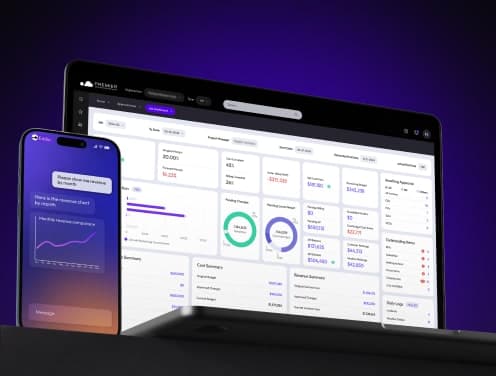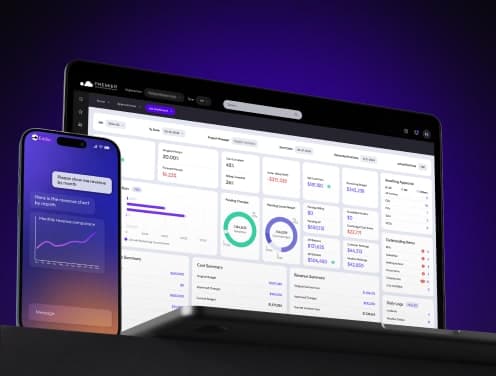
The 8 Best Foundation Software Alternatives for Construction Accounting Teams
You're not alone if you need FOUNDATION software alternatives. FOUNDATION maintains a solid 4.3 rating from 268 reviews, yet many construction accounting teams want options that suit their needs better.
Construction accounting software must match each team's unique requirements. Software Advice has verified more than 2 million reviews to share authentic user experiences. These reviews show how different teams need varied solutions. Premier Construction Software stands out as Forbes Advisor's #1 Cloud ERP for three straight years. This recognition shows its rising influence in construction software.
The market offers strong alternatives from QuickBooks Enterprise to Autodesk Construction Cloud. Each competitor brings unique strengths. Some excel at managing documents, while others shine in estimating. CoConstruct makes life easier by streamlining selections, schedules, change orders, and client communications.
Want to reshape your construction accounting process with the right alternative? Let's explore the 8 best options that could save your time, money, and reduce stress.
Premier Construction Software
Premier Construction Software ranks as a leading choice among foundation software alternatives. Forbes Advisor named it the "Best Overall Construction Accounting Software" for three straight years. This cloud-based ERP solution for construction serves as a complete platform for accounting teams who need powerful financial control.
Key Features of Premier Construction Software
The software brings an all-in-one construction accounting system that removes the need for multiple separate software solutions. Its notable features include:
- AI-Powered Analytics - Predictive intelligence helps forecast project outcomes and spots potential problems before they affect your bottom line
- Complete Financial Management - Efficient accounts payable and automated bank reconciliations handle complex construction accounting processes
- Immediate Project Visibility - Dashboards give instant access to KPIs, cost summaries, and risk alerts with drill-down capabilities
- Drawing Management - A fully integrated construction drawing management system tracks revisions and allows for markup and annotation
- Mobile Field Access - Cloud-based connectivity lets teams access data anywhere, connecting office and field operations
Premier's strength lies in its smooth integration of accounting and project management functions. Unlike other systems that piece together loosely connected products, Premier delivers a unified experience.
Pros and Cons of Premier Construction Software
Pros:
- Companies report 50% time savings in administrative tasks
- Project efficiency increases up to 40% according to customer case studies
- A single dashboard manages multiple entities and projects
- Customizable approval workflows exist for invoices, RFIs, and purchase orders
- Job dashboards come with complete data representation
Cons:
- Small businesses or startups might find the pricing expensive
- Some modules or reports have limited customization options
- Companies with high service-type work or dispatching needs might find it unsuitable
Premier Construction Software Pricing
The software uses a tiered pricing model with three main options:
Starter Plan: $249/month per user with implementation starting at $15,000
- Financial and simple job costing features
- Small construction companies benefit most
Premium Plan: $149/month per user with implementation starting at $25,000
- Financial and project management modules
- Midsize businesses choose this option most often
Enterprise Plan: $125/month per user with implementation starting at $50,000
- Financial and project management modules
- Large operations managing multiple complex projects find this suitable
A tiered named user model applies to all plans. Mobile app access costs an extra $50/user/month. The company's 30-day money-back guarantee comes with terms and conditions.
Best Use Cases for Premier Construction Software
The software proves excellent for:
- General contractors, developers, homebuilders, and specialty contractors
- Companies with $5-10M annual revenue suit the Starter package
- Businesses earning $10-75M yearly fit Premium and Enterprise packages
- Organizations moving from QuickBooks to construction-specific accounting
- Teams handling multiple projects or entities at once
Many companies achieved notable results with this software. Max Construction saved over 30 hours weekly while J. Corsi Developments cut their administrative time in half. CentreCourt's efficiency jumped by 30%, and Gillam Group doubled their revenue after implementation.
Companies seeking foundation software alternatives with cloud-based ERP functionality and integrated financial and project management should look at Premier Construction Software. The high implementation costs make it more suitable for established construction businesses rather than new ventures.
Procore
Procore stands out as one of the most prominent foundation software alternatives in the market with its detailed construction management platform. The cloud-based solution has reached over 2 million users across 150+ countries. This platform dedicates itself to construction needs and connects all project stakeholders.
Key Features of Procore
Procore divides its offerings into four main product lines:
- Preconstruction - Bid management, BIM, estimating, and prequalification tools help teams start projects smoothly
- Project Execution - Project management and quality & safety modules enable immediate collaboration
- Resource Management - Field productivity tracking and analysis
- Financial Management - Project financials, invoice management, and accounting integrations
The platform stands out with its unified approach, unlike competitors who offer disconnected point solutions. More benefits include:
- Unlimited Users - Every stakeholder can access the platform without per-user fees
- Unlimited Data Storage - Store documents, emails, photos, and other files without limits
- 500+ Integrations - Connect with apps for electronic signatures, drone footage, immediate content, and more
Pros and Cons of Procore
Pros:
- Connects field teams with office staff by removing data silos
- Makes handoffs smoother between estimating, construction, and operations
- Integrates deeply with accounting and ERP systems
- Gives immediate cost data access from anywhere
- Creates a central hub where all project stakeholders collaborate
Cons:
- Users often struggle with the learning curve
- Mobile app lacks offline functionality
- Complex features overwhelm smaller projects
- Some areas need additional features
- Small firms might find it expensive
Procore Pricing
Procore bases its pricing on volume instead of charging per user or project. The pricing structure includes:
- Annual Construction Volume (ACV) - Prices reflect your total construction project value
- Customized Quotes - Each business gets a customized quote instead of standard pricing
- Annual Contracts Only - You can't get monthly subscriptions
- Unlimited Model Benefits - One fee covers unlimited users, storage, and customer support
While exact prices aren't public, industry sources indicate costs start at $375 monthly per user for smaller setups and can reach annual fees of $20,000+ for bigger projects.
Best Use Cases for Procore
Procore shines, especially when you have:
- Medium to large construction companies with complex projects
- Multiple stakeholders needing connection (owners, GCs, specialty contractors)
- Goals to reduce rework (users see 16% average reduction)
- Plans to handle more construction volume (customers manage 48% more volume per person)
- Heavy document management needs
Procore excels at project management, financial tracking, and collaboration. Small businesses with tight budgets or teams handling simpler projects might find its extensive features overwhelming.
The platform maintains a high user satisfaction score of 4.5 from 521 reviews. This makes it a strong choice among foundation software alternatives for construction accounting teams who need detailed project management with integrated financial tools.
Sage Construction Suite
Sage Construction Suite stands as a proven foundation software alternative with more than 50 years of industry experience trusted by more than 50,000 construction companies. The company's detailed collection of construction management tools combines financial oversight with operational efficiency. This provides a robust solution for businesses that need more than traditional accounting software.
Key Features of Sage Construction Suite
Sage Construction Suite has several integrated components built specifically for construction firms:
- Cloud-Based Mobility - Teams can access and update project data from anywhere in real time
- Detailed Job Costing - Teams can track labor, materials, equipment, and subcontract costs with precise visibility
- Financial Management - The system handles complex construction accounting tasks such as progress billing, revenue recognition, and retention management
- Automated Work in Progress (WIP) - The software eliminates manual spreadsheets and generates overbilling or underbilling GL transactions automatically
- Multi-Entity Management - Companies can consolidate multiple business entities easily
- Integration Capabilities - The system connects smoothly with industry-leading tools through open APIs and the Sage Intacct Marketplace
Sage Construction Suite has multiple products: Sage Intacct Construction, Sage 300 CRE (formerly Timberline), and Sage 100 Contractor. Each product serves different business sizes.
Pros and Cons of Sage Construction Suite
Pros:
- Bank account reconciliation time drops by up to 90% according to customer reports
- Monthly close and payroll processes take 5 fewer days
- Tax reporting time decreases by 90% and payroll processing by 75%
- Estimate generation speeds up by 92% in some cases
- The software offers construction-specific features that general accounting software doesn't have
Cons:
- Many reviewers find the user interface outdated and complex
- Some reports take minutes to generate due to slower system performance
- Customer support gets mixed reviews with long wait times
- The system needs specialized training and can be hard to implement
- Total ownership costs run higher than some competitors
Sage Construction Suite Pricing
The company uses tiered pricing based on business needs and size:
Sage Intacct Construction: Mid-sized to large firms benefit from its cloud scalability and multi-entity management
Sage 100 Contractor: Small to mid-sized contractors moving beyond simple accounting find this cost-effective
Sage 300 CRE: Complex projects and real estate portfolios that need extensive customization work well with this tier
You'll need to contact Sage directly or work with authorized resellers for specific pricing. Remember to factor in implementation costs, training, and ongoing support when calculating your total investment.
Best Use Cases for Sage Construction Suite
Sage Construction Suite excels for:
- Companies that need construction-specific accounting beyond general bookkeeping
- Businesses running multiple projects or properties at once
- Organizations that must meet complex compliance requirements like certified payroll
- Construction firms looking for better financial visibility and job costing
- Specialty contractors who need integrated project and service management
The software proves most valuable when financial tracking needs to match operational realities. Companies managing retention, lien releases, and compliance requirements find the system particularly helpful.
Sage leads the construction industry as the #1 provider of accounting and estimating solutions. The company's status as the first and only AICPA Preferred Provider adds credibility that financial leaders value.
The software earns a solid 4.0 rating from 1,050 reviews despite its interface challenges. Construction accounting teams looking for industry-specific functionality will find Sage Construction Suite a dependable foundation software alternative.
Viewpoint Vista
Viewpoint Vista stands out as a complete ERP platform built for the construction industry. The platform blends job costing, financial management, HR, and service management into one package. Teams in the office and field stay connected with immediate collaboration tools that ensure everyone works with current information.
Key Features of Viewpoint Vista
The platform's architecture focuses on construction-specific functions:
- Job-Cost Accounting - Tracks costs with detailed parameters and delivers timely, accurate accounting with work-in-progress tracking
- Automated Invoicing & Payment - Speeds up billing cycles and modernizes payment processes to boost cash flow
- Workforce Management - Takes care of payroll processing, HR functions, and helps create outstanding workforces
- Service Management - Runs service operations smoothly with specialized tools
- Equipment Management - Keeps tabs on equipment usage, maintenance schedules, and related costs
- Detailed Analytics - Offers immediate cost information with drill-down options into detailed reports
Vista lets you enter budgets and change order information directly or import them from various project management solutions. Project managers can check cost information on demand to maintain profitability and stay within budget.
Pros and Cons of Viewpoint Vista
Pros:
- Options to customize based on business needs
- Strong job costing parameters track project finances
- Smooth integration with other Trimble solutions boosts productivity
- Multiple Chart of Accounts breakdowns make cost analysis easier
- Cash flow improves as work-to-billed-to-paid time drops by up to 50%
Cons:
- Setup process gets pricey with customization
- Some users find the interface outdated and clunky
- Updates sometimes break existing features
- Many required steps create a steep learning curve
- Users report inconsistent support with slow response times
A user put it simply: "Vista is ok... I like the ease of it syncing with other software".
Viewpoint Vista Pricing
The platform uses subscription-based licensing that changes with:
- Number of system users
- Selected modules
- Customization level
- Support package choice
Public pricing details aren't available, but industry sources point to monthly costs between $2,000 and $10,000+. Setup costs add a substantial amount to the monthly fees.
The sales team provides custom quotes based on business needs, unlike competitors who offer set pricing tiers.
Best Use Cases for Viewpoint Vista
Vista proves most valuable for:
- Commercial general contractors with complex projects
- Heavy/civil contractors who need detailed cost tracking
- Electrical, mechanical, plumbing, and HVAC specialty contractors
- Companies that manage multiple entities
- Businesses focused on job forecasting and performance analysis
Division leaders benefit from immediate data in Job Cost and Project Management modules for project accounting. Operations teams excel at job costing, projections, and compliance tracking with this software.
Vista shines when organizations need strong back-end accounting with project management tools. The platform handles complex construction accounting well, despite challenging implementation. Small contractors with simple accounting needs might find Vista's features more than they need.
Buildertrend
Buildertrend offers a cloud-based construction management platform that helps residential builders, remodelers, and specialty contractors manage their projects from beginning to end.
Key Features of Buildertrend
The platform's functionality revolves around five main areas:
- Sales Management - You can capture and manage leads, create custom proposals, and reach prospects through email marketing
- Project Management - The system centralizes project details, document sharing, and change order management
- Customer Management - Teams, clients and subcontractors stay connected through the Customer Portal with live updates
- Financial Management - The platform lets you track budgets, expenses, and invoices while syncing with QuickBooks and Xero
- Materials Management - Users can track material costs, build supplier relationships, and manage rebates right in the platform
Buildertrend stands out in the digital world with its mobile capabilities. Users can scan documents, track time, and manage projects from the field. User reports show this has boosted productivity by more than 50%.
Pros and Cons of Buildertrend
Pros:
- One company saved $800,000 in bookkeeping costs
- Teams save about 40 hours each week on estimating
- Online payments make operations 25% faster
- Complete document management features
- Quick and responsive customer support
Cons:
- Complex projects need more feature depth
- System glitches sometimes interrupt simplified processes
- New teams face a steep learning curve
- Interface changes can confuse long-time users
- Limited options for taxes on estimates and invoices, plus fixed costs lack flexibility
Buildertrend Pricing
The platform's pricing works this way:
- Basic Plan: $99-$199 monthly with simple features like scheduling and CRM tools
- Advanced Plan: $499 monthly adds budgeting and financial tools
- Complete Plan: $799 monthly comes with integrations and advanced reporting
The company has changed to custom pricing based on yearly construction volume and business type instead of fixed monthly fees. You'll need to contact their sales team for exact pricing.
Best Use Cases for Buildertrend
The platform works best for:
- Home builders running residential construction projects
- Remodelers working on kitchens, baths, and whole-home renovations
- Specialty contractors like roofers, landscapers, and pool installers
- Companies wanting better client communication and transparency
- Businesses aiming to simplify financial processes and improve cash flow
Real results show Buildertrend's value. A custom home builder manages projects worth over $10 million yearly with the software. Another builder saves $1,800 each year by replacing separate CRM and time tracking subscriptions.
The platform's main strength lies in being a central hub for construction information. A user explains: "We use Buildertrend for just about every facet of communication and documentation. Each member of our team uses Buildertrend in some way to do their job".
Buildertrend distinguishes itself from other foundation software with its focus on residential construction and complete cloud-based tools that bring office teams, field crews, subcontractors, and clients together in one platform.
JobTread
JobTread makes construction management simple with a platform that brings every part of your business together in one available system. The platform stands apart from other foundation software options by offering a straightforward yet powerful solution for construction teams.
Key Features of JobTread
JobTread's core capabilities include:
- Budget-First Approach - Shows financial details at every project stage and lets you track costs against budgets live
- Detailed Job Costing - Shows summaries of every cost and expense related to your jobs with detailed reporting options
- Customer Portal - Gives clients access to job documents, communications, invoices, and lets them make online payments
- Mobile Accessibility - Works fully on mobile devices without requiring customers or vendors to download apps
- QuickBooks Integration - Merges with QuickBooks Online and Desktop for smooth accounting
JobTread distinguishes itself from other foundation software competitors through its unified approach. The platform combines your entire construction business in one place. You can generate opportunities, deliver accurate proposals, and complete projects profitably.
Pros and Cons of JobTread
Pros:
- Easy-to-use interface rated 5 stars on Capterra
- Affordable solution compared to several competitors
- Highly customizable with flexible features
- Dedicated Customer Success Manager with construction experience
- Setup takes just one week for some users
Cons:
- Some features missing compared to more reliable solutions
- Users sometimes report integration issues
- New users face a learning curve despite the easy-to-use design
- Not as expandable for large-scale construction firms
- Fewer advanced financial tracking tools than alternatives
JobTread Pricing
JobTread's pricing is straightforward:
Monthly Plan: $199 per month with no contract or setup fees
- All features included with no hidden costs
- 30-day money-back guarantee
- Free implementation, training, and support
Annual Plan: $159 per month (20% savings)
- Same features as monthly plan
- Longer commitment needed
User Pricing:
- Internal users start at $20 per month
- Price breaks begin after 10 users
- External users (vendors, subcontractors, customers) are unlimited and free
JobTread skips the free trial because they assign each client a Customer Success Manager and provide detailed implementation training.
Best Use Cases for JobTread
JobTread excels for:
- Small to mid-sized construction companies that need better organization
- Contractors moving from manual processes to digital management
- Businesses aiming to improve cash flow with accurate invoicing
- Companies needing to share project information with clients and subcontractors
- Construction teams wanting live project performance updates
The platform's budget-first approach helps teams stay profitable. You can deliver consistent pricing, control costs, and spot problems early.
JobTread has grown into a practical foundation software alternative. Software Advice ranked it as the #1 Construction Management Software. Construction accounting teams can organize operations and boost profits without dealing with overwhelming complexity.
eCMS
eCMS is a specialized cloud-based construction ERP system that serves as a solid alternative to Foundation software for construction accounting teams. Computer Guidance Corporation developed this platform to combine flexibility with dependability for companies that need construction-specific functionality.
Key Features of eCMS
The browser-based interface of eCMS provides complete construction management capabilities:
- Real-time Financial Applications - Core accounting tools work among other advanced business intelligence features for better performance
- Mobile Functionality - Field teams connect with office personnel through uninterrupted data access from any location
- Project Cost Management - The system captures costs at defined intervals and identifies variances throughout project lifecycles
- Equipment Accounting - The platform tracks fixed assets, maintenance, and cost recovery with user-defined charge rates
- Document Management - The system merges content management with version control and user-based security
eCMS stands out from other foundation software alternatives through its exclusive focus on construction since 1981. The platform serves as an all-encompassing database that helps make better decisions through meaningful data presentation.
Pros and Cons of eCMS
Pros:
- Browser-based technology removes the need for client software installation
- Tier III data centers provide 99.99% uptime with automatic disaster recovery
- API-based integration works with third-party software like Comdata and Procore
- Project management scores 79.5%, higher than the 69.7% market average
- Construction-specific terminology appears throughout the system
Cons:
- Users might find the interface overwhelming due to many menu choices
- Some users report browser limitations
- Sales and customer management capabilities score lower at 61.8%
- Production and manufacturing capabilities show weak support at 48.1%
- Some users describe system performance as slow
eCMS Pricing
The subscription model for eCMS includes:
- Custom quotes that match your business needs
- A free trial for evaluation
- Starting price around $100,000
- No upfront infrastructure costs with cloud hosting
- Regular subscription-based payments
Best Use Cases for eCMS
eCMS proves particularly effective for:
- Commercial contractors with complex accounting needs
- Organizations that need multi-company, multi-division accounting
- Companies managing both union and non-union payroll
- Businesses looking to cut costs by simplifying complex operations
- Construction firms needing detailed executive and project-level financial reports
eCMS delivers construction-specific accounting functionality that suits firms handling projects of all types and sizes. The browser-based approach combines flexibility with capability, making it a valuable Foundation software alternative for your construction accounting team.
QuickBooks Online Advanced
QuickBooks Online Advanced serves as a powerful accounting solution for small to midsize construction businesses. The platform combines smoothly with popular construction management tools. Companies can enjoy flexibility without dealing with complex ERP systems through this cloud-based platform.
Key Features of QuickBooks Online Advanced
QuickBooks Online Advanced delivers construction-specific capabilities:
- Job Costing - Track costs and revenues for individual projects to monitor profitability
- Progress Invoicing - Bill clients incrementally based on project milestones
- Project Profitability Tracking - Monitor financial performance of projects live
- Bill Management - Organize and track business bills online
- Multiple User Access - Up to 25 users with customizable permission levels
Pros and Cons of QuickBooks Online Advanced
Pros:
- Users can access the platform from any internet-connected device
- The software combines smoothly with construction tools like Procore and Buildertrend
- Automated bookkeeping minimizes manual work
- Construction-specific data tracking through custom fields
Cons:
- Simple job costing features might not support complex projects
- Users often need extra apps for detailed construction management
- The tool focuses on general accounting rather than construction-specific needs
QuickBooks Online Advanced Pricing
The platform costs $275 monthly. Users can sometimes find promotional deals like 50% off during the first 3 months.
Best Use Cases for QuickBooks Online Advanced
QuickBooks Online Advanced fits perfectly for:
- Construction teams needing mobile access during site work
- Companies wanting to connect with their existing tools
- Teams looking for optimized financial management without complex ERP setup
- Businesses moving from simple accounting to construction-focused solutions
Conclusion
The right construction accounting software can reshape the scene of your business operations. Looking at these eight Foundation software alternatives reveals several standout factors. Each solution brings different strengths to the table - Premier Construction Software shines at integrated financial management, while Procore delivers exceptional project execution capabilities. Sage Construction Suite leverages decades of industry experience, and Viewpoint Vista offers detailed job costing functionality.
Buildertrend and JobTread give smaller teams user-friendly interfaces with budget-friendly pricing models. eCMS delivers specialized ERP functionality built for construction companies. QuickBooks Online Advanced remains solid for businesses moving from simple accounting to more construction-specific tools.
Your specific needs will determine the best choice. Your company's size, project complexity, budget limits, and integration requirements should guide your decision. Small residential contractors might do well with JobTread's straightforward approach. Large commercial builders might just need Premier's detailed financial controls or Procore's extensive collaboration features.
It also helps to weigh implementation time and training requirements. Platforms like Premier and Sage need substantial setup investment but deliver powerful long-term results. QuickBooks offers quicker implementation but fewer specialized features.
Note that your software should grow with your business. Companies often outgrow their original solutions as they tackle larger projects or expand operations. Today's software choice should support tomorrow's goals.
Set aside time to try demos of your top choices. Ask about how each platform handles your toughest accounting processes. Finding the right construction accounting software takes work, but better efficiency, financial visibility, and stronger profits make it worthwhile.





















